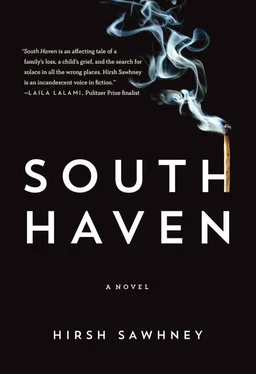Siddharth wondered what his father was feeling in that moment. Was he angry? Lonely? Did he miss Ms. Farber? No, Mohan Lal didn’t really care about her. He missed his wife, and she was dead now. Both of them missed the same person, and she was dead. Normally, Siddharth would have gotten up and wrapped his arms around him. But he didn’t feel like it tonight. Tonight he just wanted to go to sleep. As he tiptoed toward his bedroom, a small part of him felt guilty. But mostly he was filled with a deep sense of relief.
For the next two days, Mohan Lal didn’t let Siddharth answer the phone, instead sending all calls to the new answering machine. Ms. Farber stopped trying after she’d left a few unreturned messages.
Siddharth and Mohan Lal resumed their dinners together in front of the television, laughing along with their favorite sitcoms. Mohan Lal made him turkey burgers and a special vat of rajma, enough to eat all week. He asked Siddharth to check his manuscript for typos and then to read certain chapters out loud. Once or twice, Siddharth even got up in the morning and crawled into his father’s bed like he used to when he was younger. He brushed his teeth in his father’s bathroom while Mohan Lal shaved, the man dumping his mug of murky shaving water out the window for the sake of the septic system.
By the end of the week, however, Mohan Lal started to seem distant and distracted. He stayed in his office straight through dinner and resumed old habits like falling asleep in front of the television or not sleeping at all to work on his book.
Things at school weren’t much better. Even though Luca had invited him to sit at his lunch table and play kickball, he still felt on edge around these kids. One day in the cafeteria, when he was reluctantly eating the brown Indian beans his father had packed for him, Eddie Benson started sniffing the air and grimacing. “Yo,” he said, “your lunch smells like my dirty stinkhole.” For the rest of the afternoon, Eddie and Luca referred to Siddharth as the Prince of Poop.
Without Ms. Farber to collect him from school, he found himself on the bus more often, and these long rides felt quieter and lonelier than he’d remembered. One evening, his father made him come to Elm City College and sit in on his graduate-level management course so that he wouldn’t have to spend the entire evening alone. Mohan Lal showed his students a clip from a movie in which an ape picks up a bone and starts smashing the ground. The scene seemed weird and totally irrelevant, but the students kept raising their hands to make different comments — that the movie was “criticizing the inherent savagery of progress,” or that it “depicted mankind’s innate animalistic nature.”
On the ride home that night, Mohan Lal asked Siddharth what he had thought of his teaching.
“It was fine,” said Siddharth, who had spent much of the class squirming in his seat, embarrassed by his father’s accent and constantly gesticulating hands. To Siddharth, Mohan Lal actually resembled the ape from the movie.
“Just fine?”
He turned to face his father. The man looked particularly exhausted in that moment, vulnerable. Siddharth’s embarrassment and frustration suddenly evaporated. He wondered how Mohan Lal could make it in the world if even his own son were so cruel to him. “Dad, your students totally love you.”
“They do?”
“Come on — you’re one of the greatest teachers in the world.”
Mohan Lal grinned, the glow returning to his tired face.
* * *
After almost a full week without Marc or Ms. Farber, Siddharth felt himself falling into a dark place. Even his favorite movies weren’t distracting him. He needed someone to talk to, but his brother was flaky these days, and also rather annoying. First Arjun had hated Ms. Farber and ranted about their father’s selfishness, and then, out of the blue, he called to say that he thought their relationship was a great idea. “Dad’s finally moving on. You need to be mature and let him.”
Siddharth wished he could talk to Marc. Two days earlier, he’d left a message on his friend’s answering machine, but Marc hadn’t called back. At the time, he told himself it didn’t matter, that he had other friends now and was doing just fine. But he’d come to see how this was bullshit. Maybe Arjun was right. Maybe he needed to stop living in the past. His life would probably be better if his father and Ms. Farber just did whatever they wanted. He felt like an ass for the way he had acted that night — for exaggerating about his stomach.
On Saturday morning — eight days after the adults had fought — he decided to give Marc another try. He took the cordless phone into the bathroom and dialed his number. The machine picked up again, so he called Ms. Farber’s office line. She answered after three rings.
“Hi. May I please speak with Marc?”
“Siddharth? Is everything okay?”
“Can I talk to him, please?”
“He’s out, Siddharth.” Her voice was deeper than usual, and raspy. “He’s been at his father’s for the past few days.”
“Really? Why?” He heard her light a cigarette.
“What do you mean, why ? It’s his father.”
Neither of them spoke for a moment. He stared at himself in the mirror and tugged at his bangs, which came down to the middle of his nose. Soon his hair would be long enough to get it cut right — long on top and shaved on the sides.
“Siddharth, is there something you’d like to say?”
“Nope.”
“Are you sure? How’s your dad?”
Oh God, he thought. She never knew when to shut up. “He’s fine — great, actually.”
“Has he mentioned anything?”
“About what?”
“About me, Siddharth.”
He swallowed hard, wondering if he should make something up. “No.”
She scoffed. “He’s a stubborn man, your father.”
Siddharth gritted his teeth.
She took a long, audible drag. “Honey, it’s fair to say that the four of us were getting along — right?”
“I guess so.”
“You guess so? You mean you didn’t like hanging out with Marc? You boys have gotten pretty close. That’s a good thing — right?”
“Yeah.”
“Yeah, what?”
“Yeah, right. That’s a good thing, I guess.”
“Remember that, honey. Keep that in mind.”
* * *
Rain poured on and off for the next few days. It stopped on a Tuesday, and when Siddharth was walking to the bus stop that morning, he noticed that the trunks of the nearby pine trees had started oozing an orange slime. He thought about the awful afternoon that lay ahead of him. His father was insisting that he attend his idiotic after-school program. A part of Siddharth had wanted to say, Call Ms. Farber and tell her you’re sorry. But the pissed-off part of him won out, so he kept his mouth shut.
The school day was fine. During recess, he played a board game with Luca and Eddie, and then came math. Once that was over, Mr. Latella started going on about Memorial Day, which was only a couple of weeks away. He wanted to know if anybody’s father had ever served in the military. Siddharth thought about mentioning Mr. Iverson, his neighbor who rode a Harley-Davidson. Mr. Iverson had fought in Vietnam, and he and Mohan Lal were always talking about how that war was a disgrace to the nation. Siddharth wished he could bring up Marc’s uncle, who was wounded in basic training before actually shipping out to Vietnam, or Marc’s grandfather, who had been in one of the World Wars. He stayed quiet though. These people weren’t family; they were strangers.
Samantha R. raised her hand and said that her father had fought in Grenada. John G. said his grandfather had gone to Korea.
Читать дальше












